| Listing 1 - 10 of 101 | << page >> |
Sort by
|
Book
ISBN: 1421433672 1421433699 1421433680 Year: 2019 Publisher: Johns Hopkins University Press
Abstract | Keywords | Export | Availability | Bookmark
 Loading...
Loading...Choose an application
- Reference Manager
- EndNote
- RefWorks (Direct export to RefWorks)
Originally published in 1967. The ramifications of the German problem and its intricate nature make its comprehensive presentation within the limits of a manageable volume a matter of painful selection and difficult apportionment.
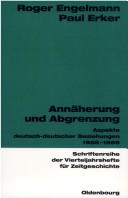
ISBN: 3486645668 3486703080 Year: 1993 Publisher: De Gruyter
Abstract | Keywords | Export | Availability | Bookmark
 Loading...
Loading...Choose an application
- Reference Manager
- EndNote
- RefWorks (Direct export to RefWorks)
Annäherung und Abgrenzung prägten in den Jahren zwischen 1956 und 1969 das innerdeutsche Verhältnis. Schritt für Schritt entfernte sich die DDR von ihrer ursprünglichen gesamtdeutschen Strategie zugunsten einer klaren Abgrenzungspolitik. Parallel dazu löste in der Bundesrepublik der Wunsch nach einem "geregelten Nebeneinander" die Hoffnungen auf eine baldige Wiedervereinigung ab. Der Band behandelt zwei wichtige Aspekte dieser Entwicklung: die jahrelangen Bemühungen um einen Dialog zwischen FDP und LDPD und die "Westarbeit" der SED. Die Darstellung beruht nicht nur auf den seit der deutschen Einigung zugänglich gewordenen Quellen, auch Akteure und Zeugen der damaligen Vorgänge wurden systematisch befragt.
German reunification question (1949-1990) --- German question (1949-1990) --- German unification question (1949-1990) --- Reunification of Germany question (1949-1990) --- Unification of Germany question (1949-1990) --- Germany (West) --- -Germany (East) --- -Relations --- -German reunification question (1949-1990) --- Germany (East) --- Relations
Book
Year: 1988 Publisher: De Gruyter
Abstract | Keywords | Export | Availability | Bookmark
 Loading...
Loading...Choose an application
- Reference Manager
- EndNote
- RefWorks (Direct export to RefWorks)
"Gromyko hat mich heute Abend um 10 Uhr zu sich bestellt, um mir eine Note zu überreichen, in der der Abschluss eines Friedensvertrages mit einem vereinten Deutschland vorgeschlagen wird." Die Übergabe der als Stalin-Note bekannten diplomatischen Notifikation und des begleitenden Projekts eines Friedensvertrages, von der der französische Gesandte in Moskau J.M. Brionval berichtet, fand im März 1952 im Moskauer Außenministerium statt. Nikolaus Meyer-Landrut beschreibt die französischen Reaktionen auf die Stalin-Note. Seine Analyse der französischen Sichtweise führt einerseits zu einer starken Relativierung der Bewertung des westdeutschen, d.h. Adenauers Einflusses auf die Meinungsbildung der Westmächte und andererseits zu der Fragestellung, dass die westliche und die östliche Position 1952 in der Deutschland-Frage unvereinbar waren.
German reunification question (1949-1990) --- France --- Germany --- Foreign relations
Book
ISBN: 0191008451 9780191008450 9780191772634 0191772631 9780198703464 0198703465 Year: 2014 Publisher: Oxford : Oxford University Press,
Abstract | Keywords | Export | Availability | Bookmark
 Loading...
Loading...Choose an application
- Reference Manager
- EndNote
- RefWorks (Direct export to RefWorks)
'Postcolonial Germany' traces the evolution of the collective memory of German colonialism, stretching from the loss of the colonies across the eras of national socialism, national division, and the Cold War to the present day. It shows to what extent this memory was intimately bound to objects of material culture in the former colonial metropole, such as tropical fruit sold atcolonial balls, state gifts handed to the former colonies at independence, and ethnological items kept as family heirlooms.
German reunification question (1949-1990) --- Germany --- Politics and government
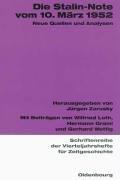
ISBN: 3486645846 3486702912 Year: 2002 Publisher: München Oldenbourg
Abstract | Keywords | Export | Availability | Bookmark
 Loading...
Loading...Choose an application
- Reference Manager
- EndNote
- RefWorks (Direct export to RefWorks)
Die Diskussion über die Absichten, die Stalin mit seiner Note an die Westmächte vom 10. März 1952 verfolgte, hält seit fünf Jahrzehnten an. War das Angebot für eine Wiedervereinigung Deutschlands als neutraler Staat ernstgemeint oder diente es nur Propagandazwecken? Haben Adenauer und die Westmächte eine Chance verpasst oder ein gegen die Westintegration der Bundesrepublik gerichtetes Störmanöver abgewehrt? Sollte die sowjetische Initiative die Position des Westens in der Bundesrepublik unterminieren oder ging es nur darum, diesem die Verantwortung für die Teilung Deutschlands zuzuschieben? Di
History of Germany and Austria --- anno 1950-1959 --- Germany --- Germany (GDR) --- German reunification question (1949-1990) --- German question (1949-1990) --- German unification question (1949-1990) --- Reunification of Germany question (1949-1990) --- Unification of Germany question (1949-1990) --- Germany (West) --- -Soviet Union --- -Foreign relations --- -German reunification question (1949-1990) --- -History of Germany and Austria --- Soviet Union --- Foreign relations
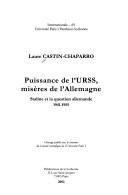
ISBN: 2859444734 9791035103712 9782859444730 Year: 2002 Volume: 69 Publisher: Paris: Publications de la Sorbonne,
Abstract | Keywords | Export | Availability | Bookmark
 Loading...
Loading...Choose an application
- Reference Manager
- EndNote
- RefWorks (Direct export to RefWorks)
Depuis la Seconde Guerre mondiale, la politique allemande de Staline a fait l'objet de perceptions radicalement opposées au sein des cercles dirigeants alliés, puis de controverses et de polémiques nourries dans l'historiographie occidentale. Que voulait en effet l'Union soviétique ? Une Allemagne unie ou divisée, une Allemagne socialiste sur le modèle soviétique ou un régime parlementaire de type occidental dans une Allemagne neutralisée sur le plan militaire ? Une longue consultation des archives de Moscou, puis une confrontation minutieuse avec les documents diplomatiques déjà publiés aux États-Unis, en Grande-Bretagne, en France ou en Allemagne ont permis à l'auteur de saisir, dans cet ouvrage, la genèse et l'évolution de la politique stalinienne, d'analyser le processus de décision en Union soviétique et dans la zone d'occupation en Allemagne, et enfin d'étudier le poids et la marge de manœuvre réels des acteurs politiques et diplomatiques en présence.
Allemagne--Réunification [Question de la ] (1949-1990) --- Duitse hereniging [Vraagstuk van de ] (1949-1990) --- Duitse herenigingskwestie (1949-1990) --- Duitse kwestie (1949-1990) --- Duitsland--Hereniging [Kwestie van (1949-1990) --- Duitsland--Hereniging [Vraagstuk van de ] (1949-1990) --- German question (1949-1990) --- German reunification question (1949-1990) --- German unification question (1949-1990) --- Question allemande (1949-1990) --- Reunification of Germany question (1949-1990) --- Réunification allemande [Question de la ] (1949-1990) --- Unification of Germany question (1949-1990) --- Soviet Union --- Germany --- URSS --- Allemagne --- Foreign relations --- Relations extérieures --- Relations extérieures --- Politics and government --- 1936-1953 --- History --- Seconde Guerre mondiale --- historiographie --- Union soviétique --- politique stalinienne --- zone d’occupation --- acteur diplomatique --- État totalitaire --- ALLEMAGNE --- U.R.S.S. --- ALLEMAGNE (R.F.A.) --- HISTOIRE --- REUNIFICATION --- 1949-1990 --- RELATIONS EXTERIEURES --- 1945 --- -ALLEMAGNE (R.F.A.) --- -U.R.S.S.
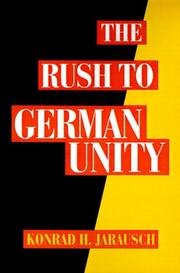
ISBN: 1280527110 0195358945 1429405783 9780195358940 9781280527111 9780195072754 0195072758 9786610527113 6610527113 0195085779 9780195085778 0195072758 0197715990 9781429405782 Year: 1994 Publisher: New York : Oxford University Press,
Abstract | Keywords | Export | Availability | Bookmark
 Loading...
Loading...Choose an application
- Reference Manager
- EndNote
- RefWorks (Direct export to RefWorks)
An historical event of the first magnitude, German unification has transformed the face of Europe. This historical reconstruction of the momentous event provides informed analyses for both students of German history and historians requiring more information on the reunification process.
German reunification question (1949-1990) --- Opposition (Political science) --- German question (1949-1990) --- German unification question (1949-1990) --- Reunification of Germany question (1949-1990) --- Unification of Germany question (1949-1990) --- Germany (East) --- Germany --- Politics and government --- Social conditions. --- History --- 1989-1990 --- Social conditions --- Unification, 1990 --- Germany (East) - Politics and government - 1989-1990.
Book
ISBN: 1782382895 9781782382898 9781782382881 1782382887 Year: 2014 Publisher: New York Oxford
Abstract | Keywords | Export | Availability | Bookmark
 Loading...
Loading...Choose an application
- Reference Manager
- EndNote
- RefWorks (Direct export to RefWorks)
The long path to the Berlin Wall began in 1945, when Josef Stalin instructed the Communist Party to take power in the Soviet occupation zone while the three Western allies secured their areas of influence. When Germany was split into separate states in 1949, Berlin remained divided into four sectors, with West Berlin surrounded by the GDR but lingering as a captivating showcase for Western values and goods. Following a failed Soviet attempt to expel the allies from West Berlin with a blockade in 1948-49, a second crisis ensued from 1958-61, during which the Soviet Union demanded once and fo
German reunification question (1949-1990) --- Berlin Wall, Berlin, Germany, 1961-1989. --- Berlin wall (1961- ) --- Berliner Mauer, Berlin, Germany, 1961-1989 --- German question (1949-1990) --- German unification question (1949-1990) --- Reunification of Germany question (1949-1990) --- Unification of Germany question (1949-1990) --- Germany (East) --- Germany (West) --- Boundaries --- History.
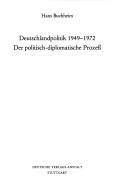
ISBN: 3421061998 3486703315 Year: 1984 Publisher: De Gruyter
Abstract | Keywords | Export | Availability | Bookmark
 Loading...
Loading...Choose an application
- Reference Manager
- EndNote
- RefWorks (Direct export to RefWorks)
Aus umfassender Quellenkenntnis sowie gestützt auf seine im Bundeskanzleramt gesammelten Erfahrungen stellt Hans Buchheim die Grundzüge und die wichtigsten Probleme Bonner Deutschland- und Ostpolitik dar: beginnend 1949 bis hin zum Abschluss des Moskauer Vertrags, des Viermächte-Abkommens über Berlin und des Grundlagenvertrags mit der DDR. Die entscheidenden Etappen und Schritte der deutschen Politik werden präzise geschildert, die maßgeblichen Verlautbarungen und Vereinbarungen aus den diplomatischen Dokumenten in enger Anlehnung an den amtlichen Wortlaut wiedergegeben. Auf diese Weise wird dem Leser ein zuverlässiges Bild der Ereignisse und Entwicklungen geboten. Buchheims Darstellung wird ergänzt durch knappe theoretische Betrachtungen zu einer Reihe von Fragen, die nach wie vor in der öffentlichen Diskussion sind: zum Beispiel die Bedeutung der viel interpretierten "Stalin-Note" von 1552, die Folgen des Baus der Berliner Mauer von 1961 sowie die Rechtslage Deutschlands und Berlins.
German reunification question (1949-1990) --- German question (1949-1990) --- German unification question (1949-1990) --- Reunification of Germany question (1949-1990) --- Unification of Germany question (1949-1990) --- Berlin (Germany) --- -Germany (West) --- -Politics and government --- -Foreign relations --- Politics and government --- West-Duitsland --- politiek --- 1945-1990 --- 1945-1990. --- Politiek --- Regions & Countries - Europe --- History & Archaeology --- Germany --- Germany (West) --- Foreign relations. --- Politics and government. --- German reunification question (1949-1990). --- HISTORY / General.
Book
ISBN: 2859395717 2757426540 Year: 1998 Volume: *3 Publisher: Villeneuve-d'Asq Presses Universitaires du Septentrion
Abstract | Keywords | Export | Availability | Bookmark
 Loading...
Loading...Choose an application
- Reference Manager
- EndNote
- RefWorks (Direct export to RefWorks)
En 1989, la chute du mur a surpris les esprits à l’Ouest, plus encore qu’à l’Est. Depuis cet événement, on essaie de comprendre comment et pourquoi un État qui fêtait son quarantième anniversaire, qui se croyait protégé par un mur auquel Erich Honecker prédisait une longue existence, s’est effondré aussi rapidement. Certes, la débâcle économique qui menaçait le pays est un facteur d’explication incontestable et déterminant. Mais, s’il peut sembler encore prématuré de vouloir dresser des bilans définitifs et donner une explication complète de l’évolution de la RDA, on peut aujourd’hui repérer d’utiles jalons quant au rôle des intellectuels dans le naufrage d’une idéologie qui avait imposé ses marques à toute une partie du monde. Cet ouvrage présente une première approche du processus d’unification allemande, vue sous l’angle de l’action des intellectuels à l’intérieur et à l’extérieur de la RDA et organisée autour de grands thèmes (concepts, théorie littéraire, acteurs, censure et répression, évolution de la contestation en RDA à partir des années 1980, intellectuels et unification). La période traitée s’étend de 1945 à 1990, avec quelques ouvertures sur les lendemains de l’unification allemande. L’un des aspects originaux de cette étude est de mettre l’accent sur le rôle des intellectuels européens de part et d’autre du Mur, leur relation au pouvoir politique, leur impact dans la lutte contre le pouvoir en RDA. L’ouvrage associe une présentation éclairante de faits connus aux résultats nouveaux d’une recherche menée dans les archives du « Congrès pour la liberté de la culture » aux États-Unis.
Intellectuals --- Opposition (Political science) --- German reunification question (1949-1990) --- Opposition (Science politique) --- Allemagne, Question de la réunification de l' (1949-1990) --- Political activity --- Germany (East) --- Allemagne (Est) --- Intellectual life. --- Historiography. --- Vie intellectuelle --- Historiographie --- German reunification question (1949-1990). --- Allemagne, Question de la réunification de l' (1949-1990) --- Politics and government --- 1945-1955 --- Germany --- History --- Unification, 1990 --- German question (1949-1990) --- German unification question (1949-1990) --- Reunification of Germany question (1949-1990) --- Unification of Germany question (1949-1990) --- Intelligentsia --- Persons --- Social classes --- Specialists --- histoire --- parole --- unification --- intellectuel
| Listing 1 - 10 of 101 | << page >> |
Sort by
|

 Search
Search Feedback
Feedback About UniCat
About UniCat  Help
Help News
News